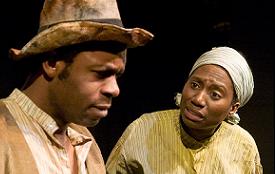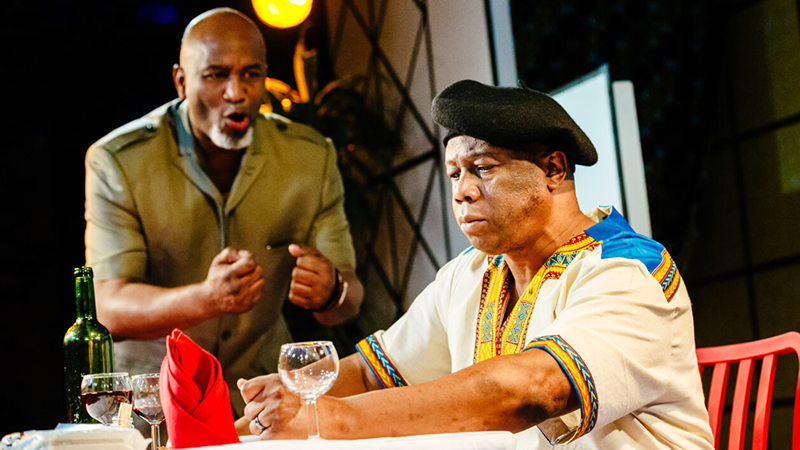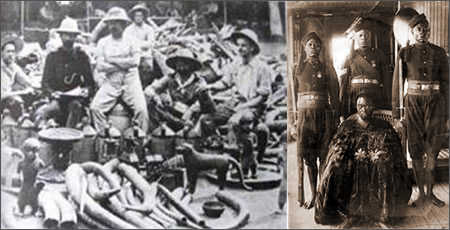This true story took place in the summer of 1855 after the alleged British abolition of the ‘slave trade’ in 1807. Celia an enslaved African was arrested for murder, by the winter of that year she had been convicted and hung. The victim, slaver Robert Newsom was said to be her ‘legal’ owner, she claimed extenuating circumstances. Her trail and execution captured the hearts and imagination of people on both sides of the Atlantic. It was discussed in Parliament and converted many to the cause for abolition. By 1860 the practice of forced physical enslavement finally came to an end.
Inspired by the historical research of Melton A McLaurin (Celia: As Slave) in writing Celia, Richard Nyeila went on a journey of discovery. Using letters and personal accounts of the enslaved Africans in the United States and the Caribbean, together with news articles and documents from slavers themselves he has pieced together a more accurate and logical depiction of the times.

From the moment this production starts you know you are watching something special. The opening scene hits the ground running and establishes the fact that we are not going to see a romanticised vision of enslavement designed to appease the sensibilities of non-African audiences.
In writing Celia writer Richard Nyeila has managed to elevate the hidden history of African resistance, the reality and brutality of decisions made by enslaved Africans to secure their freedom and ultimately bring an end to the system of their forced physical enslavement. Throughout the play we are introduced to the thought processes of ‘runaways’ - the planning and sometimes random acts of enslaved Africans who will no longer tolerate injustice. We experience an ‘auction’ scene so psychologically so harrowing, it reminds us why acts of sexual violence against women still run deep throughout the patriarchal culture of western nations.
This is a total rewriting of the typical narrative on enslavement, in some places eliciting the same emotions invoked after watching Alex Haley’s seminal series Roots, in other places surpassing it. The use of African drums throughout is a masterstroke, these juxtaposed with the humming of Christian hymns sets the tone that reflects the controlling religious mantra of the time in southern America, but respects the underlying African heart and organisation forever seeking and working towards freedom and justice.
The cast are superb. Director Malcolm Frederick has managed to wrestle a performance out of each that not only allows their individual talents to shine, but also their collective kindred spirit to teach the audience a history that few of us truly know let alone understand. Actors Shango Baku and Glenna Forster-Jones are a dynamic combination, they bring a presence to the production that only elders can. Shangos’ authority is unquestionable as is Glennas’ especially as she reminds us of why as Lucy the medicine woman, African women have always been at the forefront of our struggles and healing. Victor Romero Evans brings a powerful charismatic presence to his portrayal of Rev Johnson that brings alive the power of dynamic leadership when focused on liberation. Michelle Asante and Jothan Annan both provide essential flesh to the story, skilfully balancing a tragic tale of woe with elements of love, friendship, family and courage. Will Johnson in his role as Nathan not only encapsulates African manhood but also delivers intensity to the proceedings that had members of the audience swooning from the sexually charged energy between him and the main character herself. Celia, played beautifully by Diana Walker - her grace, intellect, strength and vulnerability are perfectly portrayed with a performance littered with passion, emotion and subtle humour. Diana owns the role, she shows the audience that Celia could be you, me, any African, her thoughts dreams, aspirations and actions are that of all people seeking freedom from unjust systems of oppression.
Are there any failings? Well usage of the n word is wholly unwarranted, although its single use in the court re-enactment delivers a punch to the heart that works. There is also too little reference to African people and too much emphasis on ‘slaves’, but in fairness this is likely to be due to the language used at the time. The usage of John Newton’s hymn Amazing Grace is jarring, but again too many are unaware that the lyrics are written by a racist slaver and rapist.
Much of the violence that is referred to is never seen but explained through a monologue with Celia. This works in that the imagination makes it real, but in some instances it is less satisfying, especially when we never get to see the murder itself. The execution of this scene whilst powerful is also subtle, for a while it is unclear as to what has occurred.
The gains however are immense. We see how the notion of family was redefined in a Pan African context reaffirming the usage of terms like uncle and auntie to refer to elders who may not be blood relatives. We are also reminded of the often maligned role of the African woman and the essence of manhood as defined by action and not talk. The portrayal of the resistance ‘pit’ meetings is welcome new ground. Central to the story is the fact that the idea of using any and all means to defend our honour is given legal consideration, but most important of all is that this era of the Maafa is treated with the respect and accuracy it deserves.
In 2007 the government announced as part of its Wilberfest abolition celebrations that the so called ‘slave trade’ would be taught in British schools through the national curriculum. Irrespective of whether that in itself is a good idea or not, it is clear that this play should be an integral part of that process. Every student of this history needs to see it, irrespective of ethnicity.

External Links
Word Media ProductionsNYT - How Master Lost His Concubine
Inspired by the historical research of Melton A McLaurin (Celia: As Slave) in writing Celia, Richard Nyeila went on a journey of discovery. Using letters and personal accounts of the enslaved Africans in the United States and the Caribbean, together with news articles and documents from slavers themselves he has pieced together a more accurate and logical depiction of the times.

Nathan and Celia: Actors Wil Johnson and Diana Walker
In writing Celia writer Richard Nyeila has managed to elevate the hidden history of African resistance, the reality and brutality of decisions made by enslaved Africans to secure their freedom and ultimately bring an end to the system of their forced physical enslavement. Throughout the play we are introduced to the thought processes of ‘runaways’ - the planning and sometimes random acts of enslaved Africans who will no longer tolerate injustice. We experience an ‘auction’ scene so psychologically so harrowing, it reminds us why acts of sexual violence against women still run deep throughout the patriarchal culture of western nations.
This is a total rewriting of the typical narrative on enslavement, in some places eliciting the same emotions invoked after watching Alex Haley’s seminal series Roots, in other places surpassing it. The use of African drums throughout is a masterstroke, these juxtaposed with the humming of Christian hymns sets the tone that reflects the controlling religious mantra of the time in southern America, but respects the underlying African heart and organisation forever seeking and working towards freedom and justice.
The cast are superb. Director Malcolm Frederick has managed to wrestle a performance out of each that not only allows their individual talents to shine, but also their collective kindred spirit to teach the audience a history that few of us truly know let alone understand. Actors Shango Baku and Glenna Forster-Jones are a dynamic combination, they bring a presence to the production that only elders can. Shangos’ authority is unquestionable as is Glennas’ especially as she reminds us of why as Lucy the medicine woman, African women have always been at the forefront of our struggles and healing. Victor Romero Evans brings a powerful charismatic presence to his portrayal of Rev Johnson that brings alive the power of dynamic leadership when focused on liberation. Michelle Asante and Jothan Annan both provide essential flesh to the story, skilfully balancing a tragic tale of woe with elements of love, friendship, family and courage. Will Johnson in his role as Nathan not only encapsulates African manhood but also delivers intensity to the proceedings that had members of the audience swooning from the sexually charged energy between him and the main character herself. Celia, played beautifully by Diana Walker - her grace, intellect, strength and vulnerability are perfectly portrayed with a performance littered with passion, emotion and subtle humour. Diana owns the role, she shows the audience that Celia could be you, me, any African, her thoughts dreams, aspirations and actions are that of all people seeking freedom from unjust systems of oppression.
Are there any failings? Well usage of the n word is wholly unwarranted, although its single use in the court re-enactment delivers a punch to the heart that works. There is also too little reference to African people and too much emphasis on ‘slaves’, but in fairness this is likely to be due to the language used at the time. The usage of John Newton’s hymn Amazing Grace is jarring, but again too many are unaware that the lyrics are written by a racist slaver and rapist.
Much of the violence that is referred to is never seen but explained through a monologue with Celia. This works in that the imagination makes it real, but in some instances it is less satisfying, especially when we never get to see the murder itself. The execution of this scene whilst powerful is also subtle, for a while it is unclear as to what has occurred.
The gains however are immense. We see how the notion of family was redefined in a Pan African context reaffirming the usage of terms like uncle and auntie to refer to elders who may not be blood relatives. We are also reminded of the often maligned role of the African woman and the essence of manhood as defined by action and not talk. The portrayal of the resistance ‘pit’ meetings is welcome new ground. Central to the story is the fact that the idea of using any and all means to defend our honour is given legal consideration, but most important of all is that this era of the Maafa is treated with the respect and accuracy it deserves.
In 2007 the government announced as part of its Wilberfest abolition celebrations that the so called ‘slave trade’ would be taught in British schools through the national curriculum. Irrespective of whether that in itself is a good idea or not, it is clear that this play should be an integral part of that process. Every student of this history needs to see it, irrespective of ethnicity.

Celia Cast (left to right): Victor Romero Evans, Michelle Asante, Jotham Annan, Glenna Forster-Jones, Shango Baku
External Links
Word Media ProductionsNYT - How Master Lost His Concubine
Ligali is not responsible for the content of third party sites





Get involved and help change our world